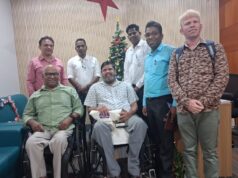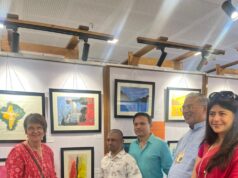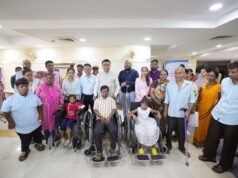Year 2024 witnessed a concerted effort by the Government of India and various stakeholders to create a more inclusive and equitable society for Persons with Disabilities. From enhancing accessibility and information dissemination to promoting skill development, employment, and infrastructure development, the initiatives launched this year by the D/o Empowerment of Persons with Disabilities (DEPwD) lay a strong foundation for continued progress in empowering and integrating persons with disabilities (Divyangjan) in India for years to come. The emphasis on collaboration, technology, and awareness signifies a holistic approach towards empowering Divyangjan and ensuring their full participation in all aspects of life and overall well-being. Here’s a look at the key highlights:
• 9 years of Sugamya Bharat Abhiyaan: Breaking Barriers, Building Inclusivity
The transformative journey of Sugamya Bharat Abhiyan marks nine years of fostering accessibility and inclusivity in India. Launched by Prime Minister Narendra Modi, this pioneering initiative has been instrumental in empowering Divyangjan, enabling them to lead lives of dignity, equality, and opportunity. On this momentous anniversary, the Government reaffirmed its commitment to creating a barrier-free nation, where accessibility is a fundamental right.
From accessible infrastructure and inclusive education to advancing technology for empowerment, the campaign embodies progress and equality. It has revolutionized public spaces, transport systems, and awareness about the rights of Divyangjan, ensuring they are not just supported but embraced as equal participants in India’s growth story.
• Accessibility and Information:
Groundbreaking Information Access: The launch of India’s first cloud-based IVRS for the Disability Information Line (DIL) (1), providing 24/7 access to information on 21 disabilities via the toll-free number 1800222014. This crucial service ensures readily available support and resources.
National Helpline for Divyangjan: A centrally maintained, user-friendly Short Code Helpline Number, 14456, was launched, simplifying access to assistance. This initiative streamlines support systems and ensures efficient service delivery.
Accessibility Standards and Training: Comprehensive Guidelines for Accessibility Standards for physical and digital skill training infrastructure were unveiled. This ensures nationwide adoption of inclusive standards by government-associated training organizations. Advanced accessibility training programmes were also launched for panel accessibility auditors and engineers, promoting universal design principles.
72 MoUs with Startups and Organizations: Signing of 72 MoUs with various startups and private organizations across multiple disability sectors, demonstrating a commitment to collaboration and innovation.
Making Information Accessible: Collaboration with the National Association for the Blind aimed to make approximately 10,000 pages of documents, including government schemes and legal reliefs, accessible to persons with visual disabilities. In an effort to enhance accessibility, the ISL dictionary is now available in 10 regional languages, ensuring broader reach and understanding across India’s diverse linguistic landscape.
MoUs signed with Inclusive Science, Mission Accessibility, and the National Association for the Blind focused on enhancing mobile application accessibility through AI technology. Another MoU with Vision Divyang Foundation aimed to use AI to guide PwDs on eligibility for government schemes.
2,500 new terms introduced in Indian Sign Language: The new terms added in the ISL cover a wide range of subjects, including mathematics, science, and higher education, as well as fields like sports and infrastructure. In addition, ISLRTC introduced 100 concept videos designed for hearing-impaired students of class 6. These videos, developed in collaboration with YUNIKEE, aim to improve concept clarity with a combination of ISL explanations, graphical imagery, and inclusive learning tools like subtitles and audio.
Pathways to Access: Publication of summaries of important judgements, orders, and circulars related to disability further enhanced access to legal and policy information.
• III. Skill Development & Employment:
Employability Enhancement: A transformative 70-hour interactive Employability Skills course for PwDs, developed in collaboration with Enable India, aimed to revolutionize access to gainful employment.
Training of Trainers (ToT) Programmes: The DEPwD conducted multiple ToT programmes on employability skills for PwDs, ensuring effective training delivery across the country.
Collaboration for Employment Opportunities: MoUs signed with the National Human Resources Development Network (NHRDN) and the Electronics Sector Skills Council of India (ESSCI), focusing on aggregating employment opportunities and providing vocational training with guaranteed placements and minimum wage compliance.
Skills for the Deaf Community: An MoU signed with YUNIKEE aimed to provide free and accessible skills to the deaf community, promoting career advancement and self-reliance.
Purple Talks: A series of sessions engaging with startups and organizations developing innovative technologies for PwDs led to MoUs with national institutions and CRCs to expand the department’s reach.
• IV. Infrastructure and Rehabilitation:
Infrastructure Development: Projects worth over Rs. 100 crore were inaugurated to enhance rehabilitation facilities and promote inclusivity. The newly constructed Service Block of the National Institute of Mental Health and Rehabilitation (NIMHR) was also unveiled.
Expansion of Rehabilitation Centres: 35 new District Disability Rehabilitation Centres (DDRC) were established across the country, expanding access to vital rehabilitation services.
Assistive Technology: An MoU signed between CSIR-CSIO and ALIMCO, focusing on collaboration in the design, development, and manufacturing of rehabilitation and assistive technology.
• Inclusivity and Awareness:
Purple Fest 2024: A historic celebration of diversity and unity was held at Rashtrapati Bhawan, bringing together over 10,000 Divyangjan and their escorts. Key launches at the event included the ‘India Neurodiversity Platform’ and a handbook on disability-sensitive language.
Divya Kala Mela: In this year DKM has been organised across multiple cities including Bhubaneswar, Pune, Visakhapatnam, Jabalpur,Raipur, Ranchi, and recently in Delhi, showcasing 1,000+ artisans and entrepreneurs. The Divya Kala Mela at Kartavya Path, New Delhi, witnessed record sales of over Rs. 3.5 crores. The 11-day extravaganza comprised of various other parallel events as well as Loan Mela, Job Fairs, Divya Kala Shakti etc., creating employment and financial support opportunities for Divyangjan.
Yoga for All: On International Yoga Day, 10,000 Divyangjan participated in mass yoga performances across India, promoting health and well-being.
Collaboration for Accessible Environments: A MoU with the Council of Architecture (COA) aimed to incorporate mandatory course modules on creating accessible environments in the Bachelor of Architecture curriculum.
Identification Guidelines: New guidelines for identification of posts for persons with benchmark disabilities and their reservation in Central Government Establishments were issued.
Thematic Celebrations – Calendar Days/ Awareness on Disability Specific Days: Across India, various days dedicated to disability awareness, health conditions, and social justice were celebrated through National Institutes and CRCs under the Department of Empowerment of Persons with Disabilities (DEPwD).
Starting the year with World Braille Day on 4th January, awareness is raised about the importance of Braille for visually impaired individuals. The World Leprosy Day, observed on the last Sunday of January, highlights efforts to eliminate leprosy. Second Monday of February marks the International Epilepsy Day. Similarly, International Asperger’s Day (18th February), and the World Day of Social Justice (20th February), focusing on neurological disorders and equality in society, were celebrated.
In March, key events like International Wheelchair Day (1st March), World Hearing Day (3rd March), International Women’s Day (8th March), and World Down Syndrome Day (21st March) were observed. April, was celebrated as Autism Acceptance Month, included World Autism Awareness Day (2nd April), World Parkinson’s Day (11th April), and World Haemophilia Day (17th April). In May, significant observances included World Thalassemia Day (8th May), Global Accessibility Awareness Day (18th May), World Schizophrenia Day (24th May), and World Multiple Sclerosis Day (30th May).
June emphasized holistic health and disability awareness through World Sickle Cell Day (19th June), International Day of Yoga (21st June), and Helen Keller’s Day (27th June). In September, events such as World Duchenne Muscular Dystrophy Day (7th September), International Day of Sign Language (23rd September), and the International Week of the Deaf (24th – 30th September) promoted inclusion for hearing-impaired individuals. Sign Language Day (23rd September) saw organization of awareness campaigns, ISL courses, and quizzes on MyGov platform. October was marked as Dyslexia Awareness Month, with specific days like World Cerebral Palsy Day (6th October), Dyslexia Day (8th October), and White Cane Day (15th October). The second Thursday of October was observed as World Sight Day, with the month also including World Dwarfism Day (25th October), World Occupational Therapy Day (27th October), and World Stroke Day (29th October).
In November, attention was drawn to prosthetics and epilepsy with the International Prosthetics and Orthotics Day (5th November) and National Epilepsy Day (17th November). The year concluded with the International Day of Persons with Disabilities on 3rd December, a day dedicated to celebrating and empowering individuals with disabilities. This year’s theme was, ‘Empowering Persons with Disabilities through Innovation’. National Awards were conferred by President of India to 33 exemplary individuals and institutions for Empowering Persons with Disabilities.These observances by DEPwD served as platforms to promote awareness, inclusion, and action for the betterment of society.





